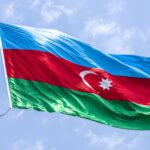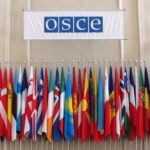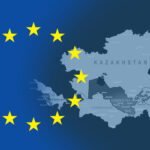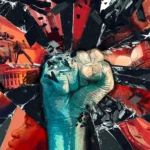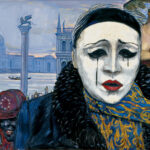Globalization from above: towards a New World Order
Throughout history, there have been multiple attempts to spread some or other universal idea across the world, as evidenced by the emergence of empires, religious expansions and totalitarian political regimes with the presumption of spreading a One Truth to the whole world. However, real globalization became possible only at the end of the second millennium after the collapse of the USSR and the Eastern Bloc. Since the article format is too limited for a detailed analysis of the topic, we shall proceed directly to the point and contrapose globalization “from above” and globalization “from below”. Globalization “from above” is an attempt by the US-led “golden billion” countries to spread around the world the models of civilization based on the rational philosophy of the Renaissance. However, only the United States (along with other “golden billion” countries) has appropriated the status of the subject of globalization. The rest of the countries are the object of globalization. The tools of globalization are transnational corporations and international transnational economic structures. In essence, they legitimize the activities of the latter, as well as the predatory economic policies of the “golden billion” countries with regard to the economies of other nations. This includes the World Bank, the World Trade Organization (WTO), the International Monetary Fund (IMF) and many others.
It is a purely economic model that focuses on two fundamental Western values: neoliberalism and the free market. Thus, we can talk about cultural globalization with strong reservations: a real globalization can only be economic, which once again confirms the almost total lack of alternatives to the power of Capital in contemporary history. It should be noted that economic globalization also leads to cultural globalization. Thus, economy is not just a component part of the above model of civilization and therefore is of a complex nature, encompassing all forms of public life. The goal of globalization is the elimination of ethnocultural differences between peoples, a “soft” elimination of the nation state (sovereignty) and the expansion of the Westernized cultural model across the world. In short, the emergence of a New World Order (“American-style democracy”) on the planet under the rule of “universal panhuman values” that can be explained by the two “economic” values mentioned above, i.e., neoliberalism and the free market. In their hit book Multitude: War and Democracy in the Age of Empire, modern intellectuals M. Hardt and A. Negri replaced the phrase “New World Order” with the term “Empire”, and this is the term we will be using in our text.
September 11, 2001 was a turning point in the globalization strategy. Since that day, the United States has radicalized the process of globalization, as reflected in President Bush’s address to Congress on September 20: “Every nation in every region now has a decision to make: Either you are with us or you are with the terrorists. From this day forward, any nation that continues to harbor or support terrorism will be regarded by the United States as a hostile regime.” In short, the world was instantly divided into black and white: the “golden billion” countries and countries forced to submit to the political and economic pressures of the “golden billion” countries on one side, and the regions that refuse to accept the aggressive dictate of “universal values” on the other. As a result of this division in the socio-political space, the phenomenon of international terrorism—the reality of stimulation that has accelerated the pace of globalization—has emerged.
What is “international terrorism”? Is it a group of thugs terrorizing the world’s civilian population for some corporate mercenary interests, or an international mafia group integrated into the highest echelons of the world establishment? A closer look reveals that “international terrorism” is a cunning concept crafted by the architects of globalization that depicts the enemies of Empire rather than real terrorists. There is a “Norm” (“American-style democracy”) built by the West (the US-led “golden billion” countries). Those who do not comply with this “Norm”, from concrete individuals (“virtual” bin Laden) to whole countries (Yugoslavia, Afghanistan, Iraq, Iran, North Korea, in short, the countries of the “axis of evil”), are automatically the subjects of terrorism and against them all forms of violence are used: international isolation, economic pressure and, finally, direct military intervention. In other words, any subject of “international law” who refuses to submit to the forces of Empire will be boycotted, with all that it implies.
Globalization from below: resistance of “multitudes”
The above model of globalization is called unipolar. Of course, those who do not want to lose their sovereignty and become a raw material base for the “golden billion” countries with multinational companies will have to face opposition from various countries. However, the real subject of resistance to Empire is the large number of people described with the term “multitude”, who have come to replace the Marxist notion of “proletariat” in modern sociology (mostly left).
The term was also used by M. Hardt and A. Negri, meaning the union of various political, social public organizations, creative groups, subcultural societies and associations as an alternative to Empire aimed at building a tolerant, just, democratic and multicultural society. This union is structured as a transnational network and is therefore almost impossible to localize. In the current situation, the following can be said about globalization from below: an informal union of large groups of people on the basis of the non-acceptance of the rules of Empire’s global order, a new social subject, such as “multitude”.
Thus, in the modern world, against the backdrop of games of political correctness—noble declarations on human rights, numerous cultural projects, events and forums—we are witnessing an exacerbation of the “class struggle”, albeit one of an anachronistic nature. In the nineteenth and early twentieth centuries, capitalism and the proletariat were the main players in the class struggle, whereas now it is Empire and the multitude. Arbitration political organizations responsible for the world security, such as the United Nations and the OSCE, have lost their functional significance after the United States took concrete actions in violation of international law. They often act as tools of Empire, as if legitimizing its violence against its enemies in the name of “human rights”, “democratic ideals” and other populist demagogic slogans. On the bright side, there is a unification of the vast masses of the world’s population in the network structures of the “multitude” in the struggle for their existential rights—the right to be a full-fledged subject of the historical process.
The impact of Western values on Azerbaijani culture
As already mentioned, after the collapse of the USSR, Azerbaijan joined the process of globalization. Given all that was said earlier about the omnivorous Empire, as well as the fact that Azerbaijan, as a small country with no experience of democracy, has historically been an “oil Klondike,” it is easy to presume that it would fall victim to the economic policies of transnational corporations and “golden billion” countries. For nearly 30 years, Azerbaijani lands were under occupation. The loss of 20% of its territory, including Nagorno-Karabakh, was largely the result of cunning geopolitical combinations not only by Russia, which is usually considered its initiator, but also by many leading world powers. Therefore, to protect its own interests, Azerbaijan, being surrounded by hostile states (with the exception of Georgia for now), is forced to pursue a delicately balanced policy, maneuvering between the Russia-Iran geopolitical axis and Western interests.
Debates on the influence of the West on Azerbaijani culture and the protection of national traditions on various level discussion platforms in Azerbaijan remain relevant. The main idea in these debates is that Western values have a negative impact on our culture in general, introducing into our public consciousness conceptual elements that are alien to the Azerbaijani “mentality”. These debates became more frequent after Azerbaijan gained independence in 1991. It should be noted here that we can talk about the alleged negative impact of Western values on our traditional culture with certain reservations. Why? Because there is no authentic tradition to speak of in Azerbaijan. The expansion of secularized Western values poses a threat only to traditional Islamic societies, such as Afghanistan, Iran, Libya, Pakistan, and so on. In this case, indeed, the deep religious doctrines of the Muslim East collide with the perverted secular values of the Christian post-Christian West. In other words, the language of Tradition collides with the language of Modernity.
Azerbaijan can be considered a Muslim country only in the name and historically. The country is hiding behind the functional form of Islamic principles, which must encompass all segments of society (the Muslim ummah), starting with the supreme authority. The years of being part of the Russian Empire, especially the USSR, have turned Azerbaijan into a secular state where none of the authentic traditions (Zoroastrianism, Christianity, Islam) that once existed in its territory took root.
The tendency to return to “true” Islamic values as part of the revival of Tradition observed in Azerbaijani society after gaining independence is rather problematic due to the ambiguity of Islam and its perception in the modern context (it is clear that this great religion needs an intellectual method that is adequate to modern standards in order to be able to adequately respond to the challenges of the modern world. The development of this method is a problem of the future.).
In modern Azerbaijan, tradition is equated with the concept of “mentality”—a totality of hard-to-traverse qualities that are fragments of archaic customs, national habits, folklore clichés and perverted ideas about what tradition is. Assessing the influence of the West, many figures in Azerbaijani culture unconsciously link Western values not to the authentic Tradition that Azerbaijan has lost at the mass social level, but to this “mentality” (with some adjustments, the same is true for the rest of the world, because the language of modernity is becoming the main language of our time, while the language of Tradition is rapidly focalizing in marginal zones). That is, these people do not understand that when talking about the preservation of tradition, they actually talk about the untouchability of the “mentality”, the setback that does not allow Azerbaijan to get out of the dark corner of Asia (according to R. Badalov).
This is a situation where the “old people” talk about “mentality”, while the majority of the younger generation (to the chagrin of this “mentality”) make attempts at radical “modernization” and create the phenomenon of mass culture and show business in post-Soviet Azerbaijan. These mass culture and show business actively influence the mass consciousness through the media. In fact, what airs on TV channels is an indicator of the cultural and moral level of the nation. Of course, the dictate of the free market and the impact of globalization manifesting itself in aggressive commercialization have led to a sudden decline in intellectual level, defected aesthetic taste, and the triumph of more neutral, infernal features of national character, which is not surprising.
When there is no expert assessment, clear criteria and critical discourse (which is also the result of the liberalization of everything), when the “people” is offered a choice, it chooses something lighter, superficial, scandalous, crude and odious: spreading dirty rumors, cheap bombshells and so on. In such a situation, the main figures of public life are not intellectuals and not even politicians, but show business personas, whose lead most young people follow. The situation is exacerbated by the fact that all this mass culture and show business bacchanalia is taking place against the background of serious social problems and deteriorating living standards of the population.
Only now, at the beginning of the third millennium, have the neoliberal ideas that facilitate the eradication of more victorious manifestations in culture and, conversely, allow incompetence to flourish and the destructive and anti-moral nature of the free market philosophy become clear to most intellectuals around the world.
Thus, in the course of some reasoning, it becomes clear that we need to talk not only about the impact of Western values on our culture (“Western values” is an ambiguous and tentative concept), but also about the impact of market economy and liberalization, which has cut down the intellectual level of Western culture itself. Undoubtedly, this is the effect of globalization that spreads the idea of the lack of alternatives to the free market and of the dominance of Capital throughout the planet without taking into account the national characteristics of the regions. However, this capitulation of Azerbaijani culture in the face of the aggression of the market and Capital was predetermined, firstly, by the withdrawal of intellectuals from the social environment and their passivity, and secondly by the negligence of government agencies that accepted Western neoliberal ideas as lacking alternative and unquestionable.
What can save the situation? In order to fix the current socio-cultural situation, first and foremost, it is necessary to have a clear understanding of the crisis in which our culture has found itself and to acknowledge the current situation as a crisis and regression. Only then can any steps be taken. It seems that the following is in order:
- Creating the infrastructure of various segments of modern culture and learning the language of modernity as a means of communication with the modern world.
- Studying the intellectual experience of Western democracies, as it combines not only neoliberal, but also many other alternative strategies, including left-wing radical and anti-globalization strategies.
- Setting up an expert group for culture, including media. Within this group, clear criteria for assessing the professional level of cultural products will be developed to prevent the release of low-quality products to the media. We must understand one thing: cultural health of the nation is nothing more nor less than a matter of national security.




